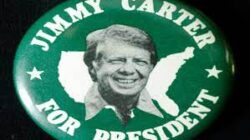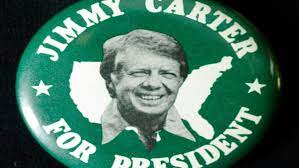The Man from Plains
Jimmy Carter burst onto America my first year in politics, 1976.
I had just joined Jim Hunt’s first campaign for governor. Democrats here feared 1976 would be a repeat of 1968 and 1972, when liberal, Northern presidential nominees, Hubert Humphrey and George McGovern, sank the party in the South.
Then came Carter.
He was different from the old Southern segregationists, like George Wallace. Carter declared “the time for racial discrimination is over” when he was inaugurated as governor of Georgia in 1971.
He was a Sunday School-teaching Christian who talked openly about his born-again faith. Some Democrats loved that. Some were uncomfortable.
He was a balanced-budget conservative when Southern Democrats were terrified of being tagged big-spending liberals.
He ran against Washington – and the Democratic establishment.
The first – and for a while the only – Democratic senator to endorse him was a 33-year-old freshman: Joe Biden.
As President, Carter’s contradictions would deeply divide the Democratic Party and lead to landslide losses in 1980.
But, in 1976, he was a blessing.
We scrambled to tie Hunt to him. When Carter stopped in North Carolina, we got a picture of him with Hunt. We spread it all over the state.
Carter carried North Carolina over President Ford by 55-44%. Hunt won with 65%.
President Carter did a lot of things right. But he and his team got a lot of the politics wrong. He was a poor communicator, especially when he was up against Ted Kennedy and Ronald Reagan.
Whatever you think about the four years he was president, he had a remarkable 42 years as ex-President.
We were lucky to have him. Especially in 1976.

The Man from Plains

Jimmy Carter burst onto America my first year in politics, 1976.
I had just joined Jim Hunt’s first campaign for governor. Democrats here feared 1976 would be a repeat of 1968 and 1972, when liberal, Northern presidential nominees, Hubert Humphrey and George McGovern, sank the party in the South.
Then came Carter.
He was different from the old Southern segregationists, like George Wallace. Carter declared “the time for racial discrimination is over” when he was inaugurated as governor of Georgia in 1971.
He was a Sunday School-teaching Christian who talked openly about his born-again faith. Some Democrats loved that. Some were uncomfortable.
He was a balanced-budget conservative when Southern Democrats were terrified of being tagged big-spending liberals.
He ran against Washington – and the Democratic establishment.
The first – and for a while the only – Democratic senator to endorse him was a 33-year-old freshman: Joe Biden.
As President, Carter’s contradictions would deeply divide the Democratic Party and lead to landslide losses in 1980.
But, in 1976, he was a blessing.
We scrambled to tie Hunt to him. When Carter stopped in North Carolina, we got a picture of him with Hunt. We spread it all over the state.
Carter carried North Carolina over President Ford by 55-44%. Hunt won with 65%.
President Carter did a lot of things right. But he and his team got a lot of the politics wrong. He was a poor communicator, especially when he was up against Ted Kennedy and Ronald Reagan.
Whatever you think about the four years he was president, he had a remarkable 42 years as ex-President.
We were lucky to have him. Especially in 1976.